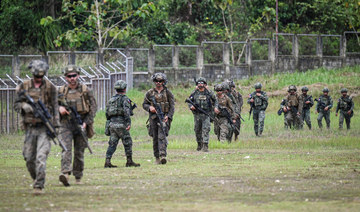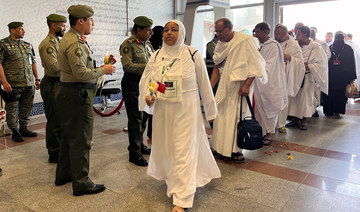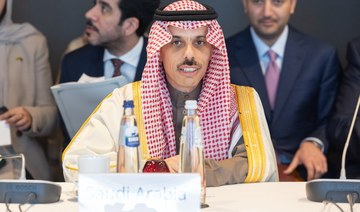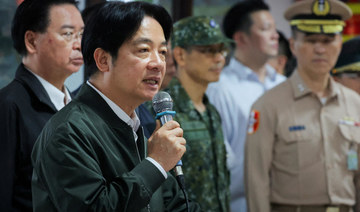LAOAG, Philippines: US and Filipino troops fired missiles and artillery at an imaginary “invasion” force during war games on the Philippines’ northern coast Monday, days after their governments objected to China’s “dangerous” actions in regional waters.
Thousands of troops are conducting land, sea and air maneuvers against a backdrop of increased confrontations between Chinese and Filipino vessels around shoals in the South China Sea claimed by Manila, as well as stepped-up Chinese air and naval activity around nearby self-ruled Taiwan.
US troops massed at a strip of sand dunes on Luzon island’s northwest coast — around 400 kilometers south of Taiwan — let loose more than 50 live 155mm howitzer rounds at floating targets about five kilometers off the coast, AFP journalists saw.
Filipino troops followed up by firing rockets aimed at wearing down the attackers, before the two forces finished the job with machine guns, Javelin missiles and more artillery rounds.
Lt. Gen. Michael Cederholm, commander of the US First Marine Expeditionary Force, said the exercise was “to prepare for the worst” by “securing key maritime terrain.”
“It’s designed to repel an invasion,” Cederholm told reporters at the exercise site.
“Our northwestern side is more exposed,” Major General Marvin Licudine, exercise director for the Filipinos, said ahead of the live firing at the La Paz sand dunes near Laoag city.
“Because of the regional problems that we have... we have to already practice and orient ourselves in our own land in these parts,” he added.
Beijing claims almost the entire South China Sea despite an international ruling that its assertion has no legal basis.
It deploys hundreds of coast guard, navy and other vessels to patrol and militarise the waters.
Just last week, Manila said the China Coast Guard damaged a Philippine Coast Guard ship and another government vessel in water cannon attacks around the disputed China-controlled Scarborough Shoal in the South China Sea on April 30.
More than 16,700 Filipino and American troops are taking part in the annual military drills — dubbed Balikatan, or “shoulder to shoulder” in Tagalog — in multiple locations across the Asian archipelago.
Maritime confrontations between China and the Philippines have raised fears of a wider conflict that could involve the United States and other allies.
Monday’s exercise came days after the defense ministers of the Philippines, the United States, Japan and Australia met in Hawaii and issued a joint statement on their strong objections to the “dangerous and destabilising conduct” of China in the South China Sea.
The ministers “discussed opportunities to further advance defense cooperation” and to “work together to support states exercising their rights and freedoms in the South China Sea.”
Last week, US forces taking part in the Balikatan exercises fired HIMARS precision rockets into the South China Sea from the western island of Palawan, the nearest major Philippine landmass to the hotly disputed Spratly Islands.
The US Marine Corps said the maneuver was a rehearsal for the rapid deployment of the missile system across the Philippines’ South China Sea coast to “secure and protect Philippines’ maritime terrain, territorial waters and exclusive economic zone interests.”
The confrontations between the Philippines and China comes as tensions have ratcheted up between Beijing and Taipei, which is about to inaugurate a new president regarded by China as a dangerous separatist.
Taiwan’s defense ministry said Friday it had detected 26 Chinese aircraft and five naval vessels around the self-ruled island in the previous 24 hours.
“To a degree, military exercises are a form of deterrence,” Philippine Foreign Secretary Enrique Manalo was quoted as saying in remarks delivered on his behalf by an aide at a public workshop on Friday.
“The more we simulate, the less we actuate,” he added.
Philippines, US fire at ‘invasion’ force in South China Sea war games
https://arab.news/yusbs
Philippines, US fire at ‘invasion’ force in South China Sea war games
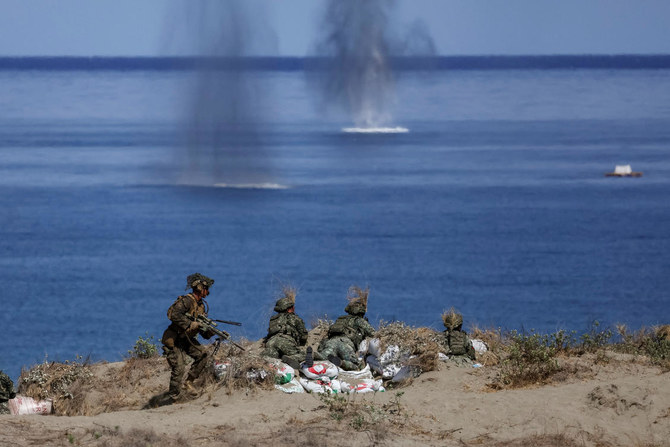
- Thousands of troops are conducting maneuvers against a backdrop of increased confrontations between Chinese and Filipino vessels around shoals in the South China Sea
33 Muslims arrested for attacking 2 Christian men on allegations of desecrating Qur’an in Pakistan
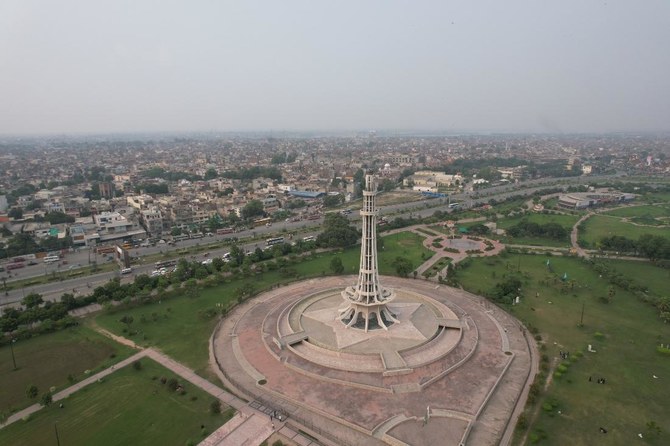
The mob went on a rampage Saturday after locals saw burnt pages of the Qur’an outside the two Christian men’s house and accused the son of being behind it, setting their house and shoemaking factory on fire in the city of Sargodha in Punjab province, said senior police officer Asad Ijaz Malhi. They also beat up the son.
Malhi said police forces rescued the two wounded men and transported them to a hospital where they were in stable condition, and that at least 33 men were arrested following multiple police raids. Authorities were chasing others who may be involved in the attack, he said.
The blaze fully incinerated the factory and parts of the house, residents and the police said.
Punjab police said in a statement it beefed up security at churches.
Blasphemy accusations are common in Pakistan and under the country’s blasphemy laws, anyone found guilty of insulting Islam or Islamic religious figures can be sentenced to death. While no one has been executed on such charges, often just an accusation can cause riots and incite mobs to violence, lynching and killings.
The latest violence, however, brought back memories of one of the worst attacks on Christians in Pakistan in August 2023, when thousands of people set churches and homes of Christians on fire in Jaranwala, a district in Punjab province.
Muslim residents at the time also claimed they saw two men desecrating the Qur’an.
Indian police arrest hospital boss after six babies die in fire
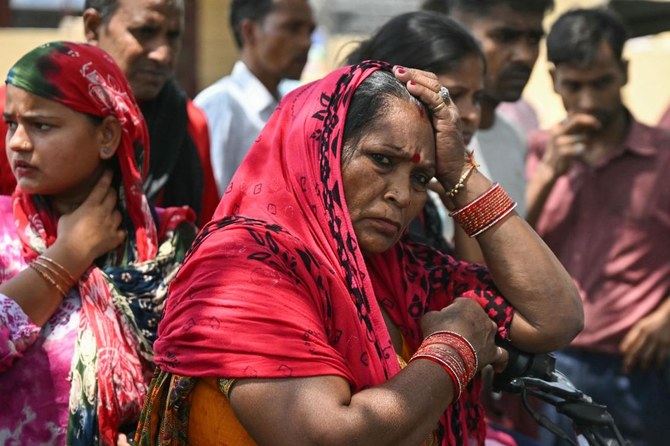
- Blaze broke out at the New Born Baby Care hospital in New Delhi’s Vivek Vihar area late Saturday evening
- The narrow two-story hospital building was squeezed between a row of homes, without space on either side
The blaze broke out at the New Born Baby Care hospital in New Delhi’s Vivek Vihar area late Saturday evening.
In the crucial first minutes, it was bystanders who spotted the fire and braved the blaze to rescue the newborns inside.
“We didn’t even name her... I never even held her in my arms,” Anjar Khan, whose 11-day-old daughter died in the blaze, was quoted as saying by the Hindustan Times.
Vinod Sharma, who lost his day-old baby boy, blamed the hospital authorities for the tragedy.
“He had a problem with breathing. The doctor had said that he will be fine in a few days,” Sharma was quoted as saying by the Indian Express newspaper.
“We didn’t know that the hospital would kill him.”
Fires are common in India due to poor building practices, overcrowding and a lack of adherence to safety regulations.
The narrow two-story hospital building was squeezed between a row of homes, without space on either side, making it hard for fire engines to reach.
“We were trying to control the fire, but there was no way to enter the building and rescue the 12 babies who were trapped,” local fire officer Atul Garg told reporters.
Senior police officer Surendra Chaudhary told AFP that the hospital did “not have a fire exit system.”
Its license had expired in March and the owner had crammed into the ward more than twice the number of beds it previously had permission for.
“The hospital had permission for up to five beds but they had installed more than 10 beds,” he said.
“In view of all this, we have made the arrests.”
Five babies pulled out from the fire are still recovering in another hospital.
The blaze in the hospital on Saturday broke out just hours after a separate fire at an amusement park in India’s western state of Gujarat.
The toll from that fire rose to 28 on Monday, police said.
The blaze — which ripped through a center with a bowling alley and other games crowded with youngsters — was triggered by welding work on the ground floor, chief fire officer Ilesh Kher told reporters.
“The CCTV footage clearly shows that a spark from the welding work fell on a stack of corrugated cardboard sheets below, causing the fire,” Kher said.
“This spread very fast as the material was highly flammable.”
The corpses were so badly burned they have not been identified so far.
Police have charged seven people with culpable homicide in connection to that fire.
The two fires came as northern India was gripped by intense heat, with temperatures in Delhi hitting 46.8° Celsius on Saturday, according to the India Meteorological Department.
China to host Egypt’s El-Sisi, Arab leaders this week
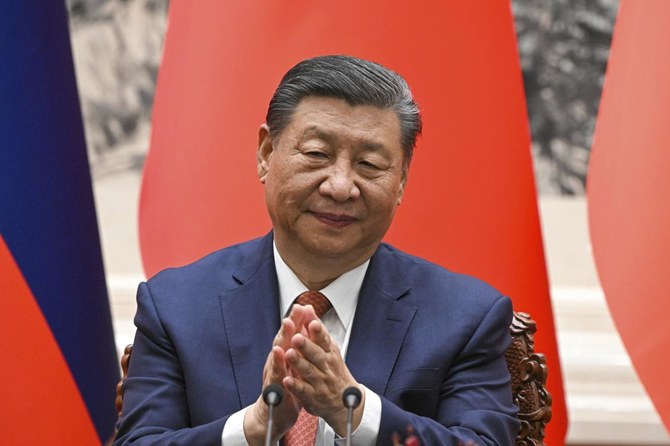
- Speaking at a press conference in Beijing, Vice Foreign Minister Deng Li said President Xi Jinping would attend the forum and deliver a keynote address on Thursday
BEIJING: China will host Egyptian President Abdel Fattah El-Sisi as well as a number of other Arab leaders in Beijing this week, its foreign ministry said Monday.
The leaders will from Tuesday to Saturday “pay state visits to China and attend the opening ceremony of the 10th Ministerial Conference of the China-Arab States Cooperation Forum,” foreign ministry spokeswoman Hua Chunying said in a statement.
Also among the delegation will be Bahrain’s King Hamad, Tunisian President Kais Saied and the United Arab Emirates President Sheikh Mohamed bin Zayed Al Nahyan.
Speaking at a press conference in Beijing, Vice Foreign Minister Deng Li said President Xi Jinping would attend the forum and deliver a keynote address on Thursday.
Xi would also “hold talks with the four heads of state respectively to exchange views on bilateral relations and regional and international issues of common concern,” Deng said.
The forum would aim to deepen “consensus between China and Arab countries,” Deng said, and would be co-chaired by top diplomat Wang Yi and his Mauritanian counterpart.
They would also “issue a common voice between China and Arab countries on the Palestinian issue,” he said.
China has sought to build closer ties with Arab states in recent years, and last year brokered a detente between Tehran and its long-time foe Saudi Arabia.
During a tour of the Middle East in January, top diplomat Wang met El-Sisi in Cairo, saying relations had reached their “best level” in history, according to a foreign ministry readout.
And the meeting with Arab leaders in Beijing comes as China seeks to position itself as a mediator in the conflict between the Palestinian militant group Hamas and Israel.
Wang’s trip to Egypt saw the two countries release a joint statement on the conflict, expressing support for a “comprehensive, just and lasting settlement.”
China has historically been sympathetic to the Palestinian cause and supportive of a two-state solution to the Israeli-Palestinian conflict.
And Xi has called for an “international peace conference” to resolve the fighting.
Israel’s has has killed at least 35,984 people in Gaza since Oct. 7, mostly civilians, according to the Hamas-run territory’s health ministry.
Millions without power as cyclone Remal pounds Bangladesh and India
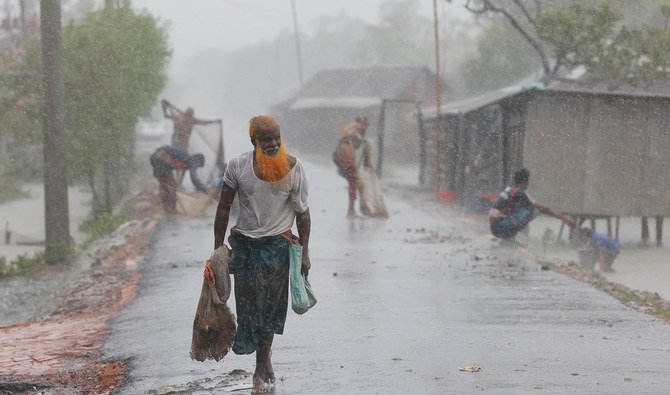
- One person killed in Kolkata after concrete chunks fell on him during storm’s peak, police say
- Bangladesh moved about 800,000 people from port areas of Mongla, Chittagong since Sunday morning
DHAKA/KOLKATA: Strong winds and heavy rain pounded the coastal regions of Bangladesh and India as severe cyclone Remal made landfall late on Sunday, leaving millions without electricity after power poles fell and some trees were uprooted by gusty winds.
The storm crossed the coastal regions of Bangladesh’s Mongla port and the adjoining Sagar Islands in India’s West Bengal state with wind speed measuring up to 135 kmph (about 84 mph), the India Meteorological Department (IMD) said.
The storm will gradually weaken into a cyclone during the morning on Monday and then move northeast and gradually weaken further, the IMD said in its latest weather update.
The landfall process began around 9 p.m. local time in India on Sunday and continued for about five hours, the regional meteorological office in Kolkata said.
One person was killed in the major metropolitan city of Kolkata when concrete chunks fell on him during the peak of the storm, police said. Roofs of thatched huts were blown away while mud houses were flattened in the coastal areas of both countries as authorities waited to ascertain the full scale of losses.
The low-lying coasts of South Asian neighbors Bangladesh and India have experienced frequent severe storms in recent years as climate change forces a rise in sea surface temperatures. Remal is the year’s first cyclone in the region.
Bangladesh moved about 800,000 people from the port areas of Mongla and Chittagong and nine coastal districts to storm shelters from Sunday morning. As many as 110,000 people were also taken to shelters in India.
Dhaka set up nearly 8,000 cyclone shelters and mobilized 78,000 volunteers ahead of the storm while the Indian navy said it had kept ships, aircraft, divers and medical supplies on standby for deployment if required.
While early warnings and timely evacuations helped both countries avert major casualties from the storm, there was a heavy toll on power infrastructure.
Authorities in Bangladesh shut down electricity supply to many areas in advance to avoid accidents while many coastal towns were left in the dark as fallen trees and broken lines disrupted supply, power ministry officials said.
“We have no electricity since night, my mobile battery will run out anytime. By the grace of Allah, the cyclone was not as violent as we thought,” said Rahat Raja, a resident in the coastal district of Satkhira in Bangladesh.
Reports of at least 356 uprooted electricity poles and damage to scores of transformers were received during the first hour of the landfall process, Arup Biswas, the minister for power in West Bengal government, said.
More than 50 international and domestic flights had to be canceled in Kolkata city as operations were suspended from Sunday noon. Bangladesh also suspended operations at Mongla and Chittagong ports.
“Normal airport operations will resume from 9 am,” said C Pattavi, the director of the Kolkata airport, adding that the airport’s operational areas were clear from waterlogging.
River embankments in the Sundarbans delta, the largest mangrove forest in the world, shared by India and Bangladesh, also suffered heavy damage with high tides breaching protective embankments at many places.
Kolkata, like the state’s coastal belt, was also lashed by heavy rains with water logging in many areas, television footage showed. At least six trees were uprooted, which blocked roads, while there were also reports of wall collapses, police said.
The cyclone also brought heavy rains to Bangladesh capital Dhaka, causing flooding of roads and severely impacting commuters.
China’s premier hails ‘new beginning’ with US-allied South Korea, Japan
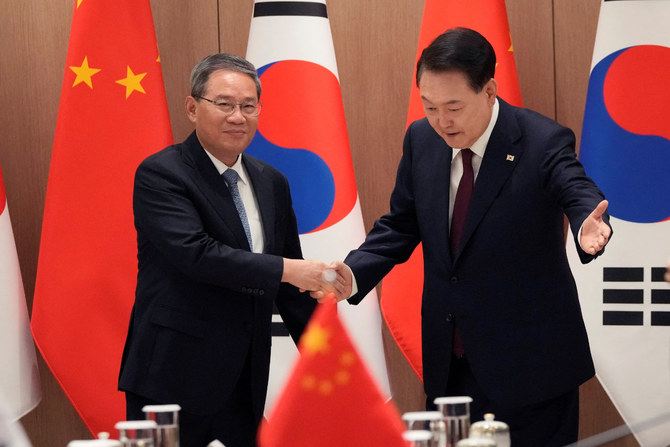
- Li Qiang met South Korean President Yoon Suk Yeol, and Japanese Prime Minister Fumio Kishida in three-way talks
- The three nations are trying to manage rising distrust amid the rivalry between Beijing and Washington and tensions over Taiwan
SEOUL, South Korea: Chinese Premier Li Qiang praised what he called a restart in relations with Japan and South Korea as he met their leaders for the first three-way talks in four years on Monday in Seoul, striving to revive trade and security dialogues hampered by global tensions.
Li, South Korean President Yoon Suk Yeol, and Japanese Prime Minister Fumio Kishida will adopt a joint statement on six areas including the economy and trade, science and technology, people-to-people exchanges and health and the aging population, Seoul officials said.
They may also agree to resume three-party free trade agreement negotiations, which have been stalled since 2019, according to Japanese media reports.
At the summit, Li called for the comprehensive resumption of trilateral cooperation with an open attitude and transparent measures, China’s official Xinhua news agency reported.
He said relations between the three nations had not changed despite profound global transformations.
“Our meeting today, first in more than four years, is both a restart and a new beginning,” Li said, according to a post on X by China’s foreign ministry.
China and US-allied South Korea and Japan are trying to manage rising distrust amid the rivalry between Beijing and Washington and tensions over democratically ruled Taiwan, which China claims as its own.
Yoon and Kishida have charted a closer course with each other and to Washington, embarking on unprecedented three-way cooperation with the United States on military and other measures.
Monday’s summit comes a day after the leaders met separately for bilateral talks with each other.
In those meetings, Li and Yoon agreed to a diplomatic and security dialogue and resume free trade talks, while Kishida and the Chinese premier discussed Taiwan and agreed to hold a new round of bilateral high-level economic dialogue.
Yoon also asked China to play a constructive role with its partners in North Korea, which is expanding its nuclear weapons and missile arsenal in defiance of United Nations Security Council resolutions.
North Korea has notified Japan of its plan to launch a rocket carrying a space satellite between May 27 and June 4, the Japan Coast Guard said on Monday.
Officials from the United States, Japan, and South Korea held phone talks in response to the notice and demanded that North Korea cancel the launch because it would use ballistic missile technology in violation of the UN resolutions, Japan’s Foreign Ministry said.
Trade relations
The trade relationship between China, South Korea and Japan has evolved over the past decade to become increasingly competitive.
Those ties have been further tested by US calls for its allies to shift their supply chains for key products, such as semiconductors, away from China.
Officials and diplomats from South Korea and Japan have set a low bar for the summit, saying it is uncertain whether there will be major announcements but that just gathering will help the three countries revive and reinvigorate their strained relations.
The three leaders are also due to attend a forum with top business executives.
South Korea, Japan and China held 16 rounds of official negotiations over a three-way FTA after they first kicked off in 2012.
At their last negotiation in November 2019, the three countries agreed on liberalization at a level higher than the Regional Comprehensive Economic partnership (RCEP), of which they are all members, encompassing areas from trade of goods and services to investment, customs, competition and e-commerce.




